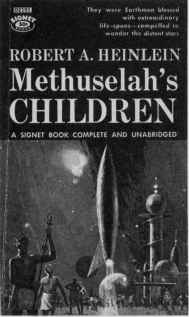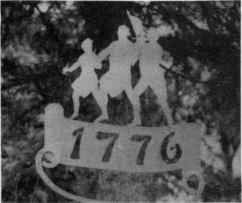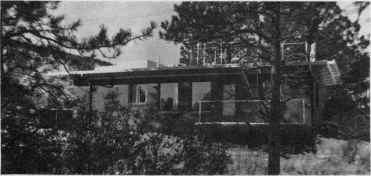Grumbles from the Grave (20 page)
Read Grumbles from the Grave Online
Authors: Robert A. Heinlein,Virginia Heinlein
Tags: #Authors; American - 20th century - Correspondence, #Correspondence, #Literary Collections, #Letters, #Heinlein; Robert A - Correspondence, #Science Fiction & Fantasy, #20th century, #Authors; American, #General, #Language Arts & Disciplines, #Science Fiction, #American, #Literary Criticism, #Science fiction - Authorship, #Biography & Autobiography, #Authorship

Trying to force myself into the more conventional method has not worked; it has simply resulted in my snapping at my wife for a couple of months and getting no other work done either. So I am going to devote the next week to an attempt to start a story suitable for
Boys' Life
on spec—no outline. Probably it will work and probably they will buy it. But if I can't click in about a week I shall have to tell them that I have nothing to offer them at this time—I shall have to cut my losses and get busy on something I can do.
September 13, 1956: Robert A. Heinlein to Lurton Blassingame
I've been wanting to write to you ever since I spoke with you on Sunday, but I have been busy on a draft of a novelette for
Boy's Life.
I finished it last night and will now try to clear my desk—starting with your letter.
I think I finally have a story that
Boys' Life
can use, provided I can now sweat it down to an acceptable length without bleeding it to death. The title is "Tenderfoot on Venus" and is about a Scout and his dog and his chum in a Boy Scout troop on Venus—no sex, no firearms, no fighting between the boys, knives used only for things that a Scout legitimately uses knives for, no villains other than the hazards of nature. I have no real doubts about the story; while it isn't immortal literature, it is a good, decent, adventure story. But I do want to use as much wordage as possible in the final draft because of the always present problem of building up a convincingly detailed background in a science fiction story laid in the future in a strange scene. Could you phone their editor and ask him for his absolute top word length? The more space I have, the better the story will be.
Final copy should be in New York about one month from now. They can count on that.
EMOTIONAL DISTURBANCES
August 27, 1953: Robert A. Heinlein to Lurton Blassingame
I greatly sympathize with her [Peggy Blassingame] emotional difficulty, being subject to it myself, although from different causes. When I am working on a book, any commitment at all other than the book itself is almost unbearable. A dinner date four days away will get between me and the typewriter and make it very hard to work. . . . very hard to keep and hold that out-of-the-world reverie that seems (for me) to be almost indispensable to empathic fiction. This neurotic peculiarity of mine is quite inconvenient to Ginny, as I am quite reluctant to take part in any social activity arranged earlier than about 5 p.m. on the day it takes place—I don't mind socializing during a story as long as I don't know about it ahead of time, but that limitation is very awkward for a hostess.
STORY CHANGES

(111)
Methuselah's Children,
Signet (The New American Library), 1960. An earlier, shorter version of the book was published by
Astounding
in 1941.
March 28, 1957: Robert A. Heinlein to Lurton Blassingame
. . . delay on
Methuselah's Children.
Both Ginny and I have been over it carefully since I last wrote. She thinks it needs a complete rewrite from beginning to end; I am certainly convinced that it should not go on the market until I have worked on it a bit and perhaps completely rewritten it. I greet this task with the delight with which I change a tire in the rain at night, but it has to be done, I am afraid. Worst of all, it uses time I had intended to put onto new copy. With luck I should forward it to you not too late in April . . .
. . . My strongest misgiving about a release through Doubleday is on other grounds, however: I am afraid that
Methuselah
simply does not stand up to the quality of
Puppet Masters
and
The Door into Summer,
I am afraid it would look like a slump. It was written sixteen years ago; I have learned something of storytelling techniques in that time, I think.
EXCERPTS
February 16, 1968: Robert A. Heinlein to Lurton Blassingame
And I have another letter from ---- concerning that request to use an excerpt from "Logic of Empire." This time he tells me approximately (not exactly) what he wants to excerpt but says that he cannot tell me how much I would be paid. Well, from what I know of British prices, I doubt if he contemplates paying more than ten to twenty dollars for a thousand words. But I can't see why he expects me to sell for an unstated price. I'm tempted to tell him that short excerpts call for short-short story rates—say about a shilling a word.
But I'm going to tell him no again, (a) I don't like to see my stories chopped up, in any case; each is meant to be read as a whole, (b) I have a dirty suspicion that he wants my name on the dust jacket at a cost of about ten bucks, (c) The controlling point: I don't like his action in bypassing my agent. If he wanted a rehearing he should have submitted his second proposal to you—he certainly knows who you are and where you are.
Damn it, on second thought I am not going to answer him now; I'll enclose his letter instead. If you want to answer it, do so. If not, send it back and I will do so. But I certainly do not like his unprofessional behavior in intentionally trying to bypass my agent.
INTRODUCTION
January 14, 1963: Robert A. Heinlein to Robert Mills
Lurton tells me that you and he have reached an agreement on the use of "Zombies" ["All You Zombies"] and that you now want an introduction to the story from me, telling why it is "one of my favorites."
At that point it suddenly lost status with me. The prospect of writing a blurb for one of my own stories I find almost as filled with grue as is attending an autographing party or writing for a fanzine. Why don't you write it? You seemed to like this story better than I did and your blurb in FSF [
The Magazine of Fantasy and Science Fiction
] was okay.
But, if you must have it, how about this:
"Mark Twain invented the time travel story; six years later H.G. Wells perfected it and revealed its paradoxes. Between them they left little for latecomers to do. But they are still fun to write. Some stories are chores, some are fun—this is one I enjoyed writing."
But I would still prefer for you to blurb it. If an author writes his own blurb, he is caught between the horns of conceit and false modesty.
FREE OPTION
January 27, 1961: Robert A. Heinlein to Lurton Blassingame
My whorish instincts protest the idea of a free option even for six months—but I'm willing to go along, pursuant to your advice. He [a would-be producer] would be a lot better off (safer) and I would be happier if there were some minor cash involved, with the deal spelled out. The option money needn't be much and it could have renewable dates by small payments. However, I suspect that he does not want to sign a formal option now because that necessitates spelling out the deal which is being optioned—and he probably hasn't any clear idea what the deal might be until he has a treatment to show financial backers.
CHAPTER VII
BUILDING
COLORADO SPRINGS
Editor's Note: When Robert and I were first married, we lived in Colorado Springs. After the motion picture script sold, it was necessary to move to Hollywood, as Robert was to be technical director for what became
Destination Moon
.
After the shooting on the film was completed, Robert's contract was up, so we returned to Colorado to build our house there. While we were building, the Korean War began—although it was called a "police action," it was a full-fledged war; the draft was still in place, and prices on everything began to soar. Robert might be called back to do engineering, and although I was on inactive duty, there was the ever-present possibility that I might be called back to active duty. Neither of those things happened, but we went through a period of not knowing whether we would have to leave our house half-built and go off to war.
In one of these letters there is mention of the quickly rising costs of lumber; Camp Carson nearby Colorado Springs had been renamed Fort Carson, and an enormous building program had begun there. We were caught by the rising prices on everything needed to complete the house.
Before Robert began writing, he had some interest in planning single-family houses. He had several plans of his own. However, those were for a flat area, and the lot we purchased was on a hillside. Neither one of us was prepared, though, for the intricacies of the actual building of a house.
I was required to read
Mr. Blandings Builds His Dream House. We both avoided the mistakes in that story, but we made a brand new set of our own.

(115)
1776 Colorado Springs Street. The Heinleins got to pick their own house number for their Colorado Springs house. They moved in in 1950.
July 9, 1950: Robert A. Heinlein to Lurton Blassingame
. . . We are going ahead with building and have the foundation in, the services in, and the septic tank built, but I shall have to shut down the job again and wait if monies do not come in. Yes, I know I could remedy that by giving you new copy and I wish to Heaven I could—but I am so fouled up with . . . handling payroll and purchases, and trying to be an architect that I can't write stories. I continue to have much trouble with the contractor.
August 13, 1950: Robert A. Heinlein to Lurton Blassingame
. . . I am sorry to get tough with him, but I've got to have the money. The checks you sent me got me past this week's payroll—but I had a serious disappointment on another matter this week and I am more strapped than ever. In the meantime, the army is reactivating a base here with a million dollar construction program and all local lumberyards immediately boosted their prices. Lumber has gone up
60%
around here in the last six weeks. Nevertheless, the roof is being framed up now; we'll have it closed in by the end of this week—and we'll move in around Labor Day, if my nerves hold out. Then I intend to stop everything and start turning out new copy.
August 14, 1950: Robert A. Heinlein to Lurton Blassingame
Your letter of 11 August arrived today and caused us much jubilation . . . an advance check on the NAL contract twice the size we had expected, news that you had sold "Roads" ["The Roads Must Roll"] for TV, and news of the Kellogg show [
Tom Corbett, Space Cadet
] for
Space Cadet.
Ginny and I are agreed that you are the original miracle man. All this adds up to no more real money worries for Robert and assurance that we can finish our house in an orderly fashion without a mortgage.
Editor's Note: We moved into the house Labor Day weekend. It was closed in, glazed, but the clerestory needed to have the glass bricks installed, so we spent the weekend pushing oakum into the spaces around the glass bricks, "floating" them. I obtained a large roll of brown paper and stapled it to the wall studs. At least we had a place to live in. The subfloor was laid, but it would be a long time before the house was finished. And Robert sat down and wrote
The Puppet Masters
.

(116)
The Heinleins' house at Colorado Springs. They had the house built themselves and ran into many difficulties—not the least being a shortage of building materials due to the war in Korea!
September 13, 1950: Robert A. Heinlein to Lurton Blassingame